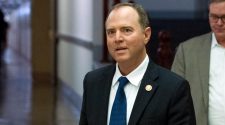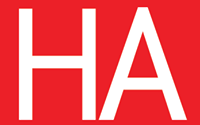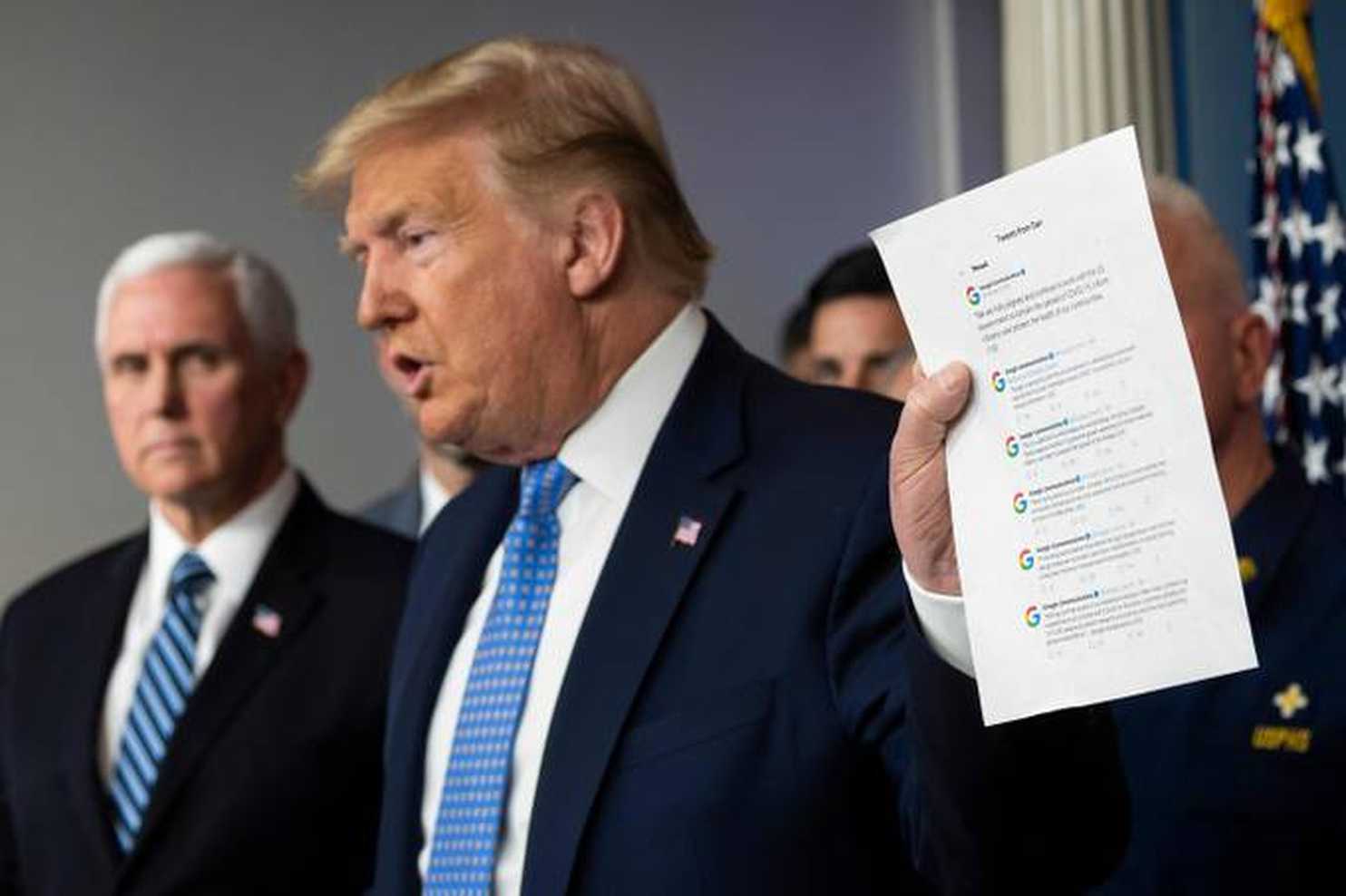President Trump holds up tweets from Google as he speaks during a press briefing about the coronavirus alongside US Vice President Mike Pence on March 15, 2020. (Photo by JIM WATSON/AFP via Getty Images)
With Tonya Riley
Ctrl + N
The coronavirus crisis is testing whether Big Tech can restore its reputation in Washington after years of backlash and scrutiny.
Companies are presenting themselves as advocates of the U.S. government in its efforts to stop the spread of the virus, keep unemployment down, push out critical public health information and support workers financially.
“This is a reminder that ultimately the innovation of technology companies is needed to address the most serious challenges that face our nation and the world,” said Rep. Ro Khanna (D-Calif.), who represents Silicon Valley.
But it’s tricky terrain. If the industry doesn’t tread carefully – especially to preserve users’ privacy – companies risk coming out of the crisis looking like villains rather than heroes.
Khanna cautioned: “The project of technology needs to be managed in a way that has everyone benefit, that has everyone have access and that it has to be shaped by democratic values.”
Here are some of the ways Silicon Valley is helping:
- The U.S. government is in ongoing talks with tech giants and other companies and health experts about using location data from Americans’ phones to trace the spread of the novel coronavirus, my colleagues report. Facebook executives told my colleagues they’re providing statistical data to researchers to predict the next hotspot. Google is exploring ways to leverage its trove of location data, particularly any insights it can glean from its popular Maps app, that might help officials study the effects of social distancing.
- Facebook is opening its checkbook to support those financially hit by the virus. The company yesterday announced $100 million in cash grants and ad credits for small businesses experiencing disruptions. It’s also giving a $1,000 bonus to each of its 45,000 employees.
- Amazon is significantly expanding its U.S. workforce, opening 100,000 new positions in its fulfillment centers and delivery network to keep up with the surge of demand resulting from the coronavirus.
- Multiple tech companies are committing to help government officials and health experts spread key public health information. Alphabet chief executive Sundar Pichai promised to help the government build a website dedicated to covid-19 education, prevention and local resources nationwide.
But these efforts are already under scrutiny by the tech industry’s top critics – and there will be little room for any missteps.
“I’m glad that they’re willing to help, but I hope they’re actually helping and not using this as an opportunity to drum up business for themselves,” said Sen. Josh Hawley (R-Mo.) to reporters gathered at the Capitol yesterday.
Hawley is particularly concerned about a new virus screening tool that Verily, a subsidiary of the Google parent company Alphabet, launched earlier this week. The site, which is so far only available to some Bay Area counties in a pilot, is designed to determine whether people need to get tested and find local places to do so. But it requires users to have a Google account to use the service. They also have to give the company permission to share their data with health care professionals, public health authorities and tech companies such as Google.
“I’ve got a big problem with that,” Hawley said. “I don’t think that this ought be an opportunity for these tech companies to harvest consumers and customers when people are in desperate straits.”
The news that the companies are exploring ways to use people’s highly specific location data to combat the virus — even in an anonymized, aggregated form — is also sparking privacy concerns.
“Privacy is the first to go when there are national security issues,” Ashkan Soltani, a former Federal Trade Commission chief technologist, told my colleagues yesterday.
Other countries – including China, South Korea and Israel – have been more aggressive in using location data to curtail the spread of the virus, prompting concerns among privacy advocates who say location data can be particularly invasive. Earlier this week, the New York Times reported that Israel was tapping a secret trove of cellphone location data. Multiple sources stressed to my colleagues that the discussions in the U.S. are not about building a government location database.
Lawmakers are also ratcheting up the pressure on the companies to address rampant coronavirus misinformation and price-gouging on their services. Sen. Mark R. Warner (D-Va.) and Sen. Richard Blumenthal (D-Conn.) slammed Google in a letter to the Federal Trade Commission yesterday for allowing ads that capitalize on coronavirus fears, such as peddling products such as medical masks. The company said it would ban such ads.
The lawmakers urged the FTC to intervene if consumers cannot rely on the company’s representations of its business practices. “These misrepresentations generate direct harm to consumers, exploiting their legitimate fears over the covid-19 outbreak to overcharge them for products,” the senators wrote. “They also create widespread social harms to our nation’s response to this crisis, such as by contributing to shortages of products essential to the health care workers on the front lines of the covid-19 response.”
There’s also been increased scrutiny of the companies’ treatment of their most vulnerable workers, particularly contractors and in warehouses, even as they dedicate resources to hiring or bonuses. Amazon warehouse employees have raised concerns that the company is not doing enough to protect them, especially after Amazon workers in Spain and Italy tested positive for the virus. And according to The Intercept’s Sam Biddle, Facebook will not provide its bonus to contractors who keep its apps running.
BITS, NIBBLES AND BYTES
Facebook logo. (Loic Venance/AFP/Getty Images)
BITS: Facebook appeared to be marking posts and articles about the coronavirus from reputable news sites as spam yesterday, my colleague Derek Hawkins reported in a live blog. The system glitch adds to scrutiny of the platform’s ability to moderate coronavirus-related content.
Users flagged that the company had marked articles from the Atlantic, Politico and BuzzFeed News for removal, Cameron Wilson at BuzzFeed News reported.
Facebook vice president of integrity, Guy Rosen, said in a tweet that the glitch stemmed from a bug in the anti-spam system. He refuted speculation that the removals were the result of Facebook sending thousands of its moderators to work from home.
We’re on this – this is a bug in an anti-spam system, unrelated to any changes in our content moderator workforce. We’re in the process of fixing and bringing all these posts back. More soon.
— Guy Rosen (@guyro) March 17, 2020
A Facebook representative did not immediately return a request for comment.
The posts were restored by 9:30 p.m., but NBC News journalist Brandy Zadrozny pointed out how the incident highlighted the power of Facebook:
Dozens of panicked emails and DMs about removed posts really drive home for me how powerful FB is, how emotionally tied people are to their posts, and how distrustful users are of the platform. https://t.co/3kwpEjkzlh
— Brandy Zadrozny (@BrandyZadrozny) March 18, 2020
A telemedicine video conference. (Mark Lennihan/AP)
NIBBLES: The Trump administration yesterday temporarily suspended rules that restricted doctors’ communications with patients via phone or video apps, my colleague Joseph Marks reports. The new order could be a boon to national efforts to increase the use of telemedicine during the coronavirus pandemic.
The loosened data protections under the Health Insurance Portability and Accountability Act (HIPAA), allow doctors to use free commercial tools such as Apple’s FaceTime, Google Hangouts, Microsoft’s Skype and Facebook Messenger’s video chat feature to consult with patients.
The unprecedented move could greatly expand access to telemedicine, but it could make patients’ information more vulnerable to hackers. Some cybersecurity experts tell Joseph it’s worth risking that trade-off.
“We’re in a different environment today with this pandemic … Putting a patient in front of a doctor is what’s important,” Curtis Dukes, a former top National Security Agency official who’s now executive vice president of the Center for Internet Security, told Joseph. “Given where we are today with covid-19, this is a prudent step by the administration.”
Telemedicine companies say they’re used to meeting strict data security requirements, and deregulation will make it easier for them to reach patients.
“I think it’s a balance. For decades the telemedicine industry has been overregulated,” Jon Peace, CEO of telemedicine company Zipnosis, told Tonya. “On the flip side, I do think we need to make sure any telemedicine providers are held to basic protections. Generally deregulating it and making it easier for patients to access it is great.”
Attorney General William P. Barr. (Patrick Semansky/AP)
BYTES: There will be “severe ramifications” if the United States finds that a foreign government was behind a hacking and disinformation campaign to spread panic about the coronavirus, Attorney General William P. Barr told the Associated Press’s Michael Balsamo.
The Justice Department is investigating the spread of an SMS-based disinformation campaign claiming that President Trump would implement a national quarantine as well as a possible attack meant to knock out computer networks at the Department of Health and Human Services.
“When you’re dealing with something like a denial of service attack on HHS during a pandemic, that’s a very grave action for another country to take,” Barr told Michael.
He did not speculate about which country was behind the attack.
The misinformation campaign appeared to be aimed at spurring shoppers to rush to stores, emptying shelves and disrupting the food supply. Both national security officials and Trump debunked the rapidly spreading conspiracy.
The attorney general also slammed efforts by scammers to profit off coronavirus concerns. Barr urged U.S. attorneys to prioritize prosecuting people for scams and cybercrimes related to the pandemic in a memo Monday.
PRIVATE CLOUD
The WeWork logo. (Bryn Colton/Bloomberg News)
— SoftBank may not follow through with its plans to bail out WeWork, Liz Hoffman and Eliot Brown at the Wall Street Journal report. The investment titan privately told investors that several regulatory probes into the start-up’s business could nullify a deal the companies struck last fall.
The potential reversal adds to mounting financial concerns posed by the coronavirus outbreak — but it remains to be seen whether SoftBank will make good on its threat.
“The Japanese investment giant didn’t explicitly cancel the deal, and its notice to WeWork could be a negotiating tactic, or a way to delay the investment as markets remain volatile,” Liz and Eliot report.
SoftBank previously agreed to purchase $3 billion in shares from investors, including former chief executive Adam Neumann, as a part of its bailout of the company in the fall. The Japanese firm received demands from the Securities and Exchange Commission and Justice Department in the course of probes into the company in recent months.
— More news from the private sector:
PUBLIC CLOUD
— News from the public sector:
FAST FWD
— News from the tech workforce:
#TRENDING
—Tech news trending around the web:
















